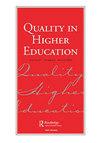阿富汗的质量保证和认证:探索政策执行中的意义和赋予意义
IF 1.5
Q3 EDUCATION & EDUCATIONAL RESEARCH
引用次数: 2
摘要
本研究调查了阿富汗公立教学和研究型大学的认证实施情况。采用定性多案例研究设计,对来自5所大学的46名个人进行了访谈。研究结果显示,参与者将质量保证和认证概念化为组织意义构建,强调在探索意义构建时的上下文环境。在研究型大学,认证是一项社区努力,而在教学型大学,由于只有领导和质量保证单位参与到认证过程中,参与认证似乎是片面的。这意味着:(a)高层领导对认证过程的认真参与最大限度地提高了员工对认证的参与度;(b)预算和自主权有限、资源稀缺、学术人员缺乏意识和抵制等因素挑战了阿富汗大学的认证。该研究建议增加大学的预算和自主权,对大学领导进行管理培训,并修订认证框架,使其对教学和研究型大学更加灵活。本文章由计算机程序翻译,如有差异,请以英文原文为准。
Quality assurance and accreditation in Afghanistan: exploring sensemaking and sensegiving in policy implementation
ABSTRACT This research investigated the implementation of accreditation at public teaching and research universities in Afghanistan. A qualitative multi-case study design was used to interview 46 individuals from five universities. The findings revealed that participants conceptualise quality assurance and accreditation as organisational sensemaking that emphasises contextual circumstances in exploring meaning construction. Accreditation is a community effort at research universities while engagement with accreditation seemed partial at teaching universities given that only the leadership and quality assurance units were involved in the process. The implications are that (a) a serious involvement of senior leadership in the process maximises employees’ engagement with accreditation and (b) factors such as limited budget and autonomy, scarce resources, lack of awareness and resistance of academic staff challenge accreditation in Afghanistan universities. The study recommends an increased budget and autonomy for universities, management training for university leaders and revision of the accreditation framework to be flexible to teaching and research universities.
求助全文
通过发布文献求助,成功后即可免费获取论文全文。
去求助
来源期刊

Quality in Higher Education
EDUCATION & EDUCATIONAL RESEARCH-
CiteScore
3.30
自引率
14.30%
发文量
32
期刊介绍:
Quality in Higher Education is aimed at those interested in the theory, practice and policies relating to the control, management and improvement of quality in higher education. The journal is receptive to critical, phenomenological as well as positivistic studies. The journal would like to publish more studies that use hermeneutic, semiotic, ethnographic or dialectical research as well as the more traditional studies based on quantitative surveys and in-depth interviews and focus groups. Papers that have empirical research content are particularly welcome. The editor especially wishes to encourage papers on: reported research results, especially where these assess the impact of quality assurance systems, procedures and methodologies; theoretical analyses of quality and quality initiatives in higher education; comparative evaluation and international aspects of practice and policy with a view to identifying transportable methods, systems and good practice; quality assurance and standards monitoring of transnational higher education; the nature and impact and student feedback; improvements in learning and teaching that impact on quality and standards; links between quality assurance and employability; evaluations of the impact of quality procedures at national level, backed up by research evidence.
 求助内容:
求助内容: 应助结果提醒方式:
应助结果提醒方式:


